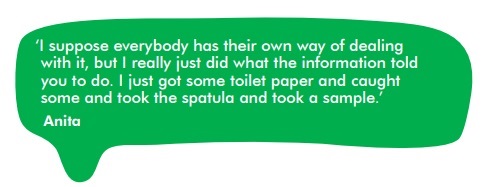Bowel cancer is one of the most common cancers in the UK. When it’s found early it can often be cured. Screening helps find bowel cancers at this early stage and before they become more difficult to treat. So, for Bowel Cancer Awareness Month, here is our information development nurse Hilary with 5 facts about bowel cancer screening.
1. Screening starts in your own loo
The first part of bowel cancer screening is the FOB test. This involves testing small poo samples that have been collected on three different days. It’s quick and simple to do. You’ll be sent a kit to use in the privacy of your own bathroom – which helps to cut down on embarrassment. When you’ve collected your samples, send them back in the prepaid envelope.

You’re usually invited for your first screening between the ages of 50 and 60. But screening programmes in each country are slightly different.
2. The FOB test checks for blood
The FOB test can’t diagnose bowel cancer. It just finds any tiny amounts of hidden blood in the poo. For a few people this blood can be a sign of bowel cancer.
You will get a letter with the results of your FOB within two weeks. For most people, no blood is found, no more tests are needed and you’ll be sent another FOB kit in two years.
3. Blood doesn’t always mean cancer
A small number of people will have an abnormal FOB test which means blood was found. About 1 in 10 of these people have bowel cancer. But blood in poo can also be caused by conditions such as:
4. So, other tests can find out more
If the FOB shows blood, you can have other tests to find out why. You’ll be offered an assessment and usually a camera test such as a colonoscopy to check inside the bowel. It’s not unusual to find polyps. These can often be removed during the colonoscopy which can help prevent bowel cancer developing.
5. Symptoms still matter
If you have any of these symptoms, don’t wait for your next screening test - talk to your doctor:
How can I find out more?
Bowel cancer screening saves lives by finding cancer early when it can be cured. It’s always your decision if you want to have bowel cancer screening or not. Sometimes there are reasons screening might not be suitable. If you’re not sure or you have questions, contact your local screening helpline number (below) or your GP.
Bowel screening helplines:
Find out more:
To see what else Macmillan's cancer information team has been blogging about, please visit our blog home page! You can subscribe to receive our blogs by email or RSS too.
We're with you every step of the way
The Macmillan team is here to help. Our cancer support specialists can answer your questions, offer support, or simply listen if you need a chat. Call us free on 0808 808 00 00.
Comments? Feel free to add them below (you need to be logged in).
Keep in touch Follow Macmillan’s cancer information team on Twitter @mac_cancerinfo
Whatever cancer throws your way, we’re right there with you.
We’re here to provide physical, financial and emotional support.
© Macmillan Cancer Support 2026 © Macmillan Cancer Support, registered charity in England and Wales (261017), Scotland (SC039907) and the Isle of Man (604). Also operating in Northern Ireland. A company limited by guarantee, registered in England and Wales company number 2400969. Isle of Man company number 4694F. Registered office: 3rd Floor, Bronze Building, The Forge, 105 Sumner Street, London, SE1 9HZ. VAT no: 668265007